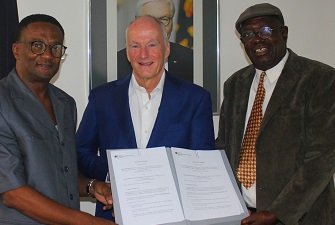
US funding for self-help projects

The US Ambassador to Namibia, Ms. Wanda Nesbitt (with blue tunic) launched a workshop for members of community projects that are funded under the Ambassador’s Self-Help Programme. The individuals who attended the workshop are responsible for managing the projects. The workshop provided basic training on managing the funds and their projects.
The individuals in charge of each project attended a workshop last week to improve capacity and to train them in simple project management and administration of the funds. Together the projects received funding of N$425,000. The projects must help general development of the community. The training workshop focused on financial management and new project leaders were mentored through one-on-one consultations with previous recipients. The US Ambassador’s Self-Help Programme is a grassroots assistance programme that provides financing for small, community-based projects that are initiated and administered at the local level. Projects generally include significant contributions in cash, labour, or materials from the local community and are expected to be self-sustaining. The Self-Help Programme, operating in Namibia since 1990, has provided nearly N$19 million in funding to community-based development projects throughout the country. The 2013 projects encompass a diverse range of locally-generated initiatives to improve social and economic conditions. These projects include a range of income-generating activities such as gardening, brick-making, dairy production, and tailoring. One project provides food for learners from a gardening project at a secondary school. Two other projects assist dozens of disabled children and adults by selling food. One sells ice cream while the other will increase the productivity and profitability of a lunch stand and catering service run by disabled adults.











































